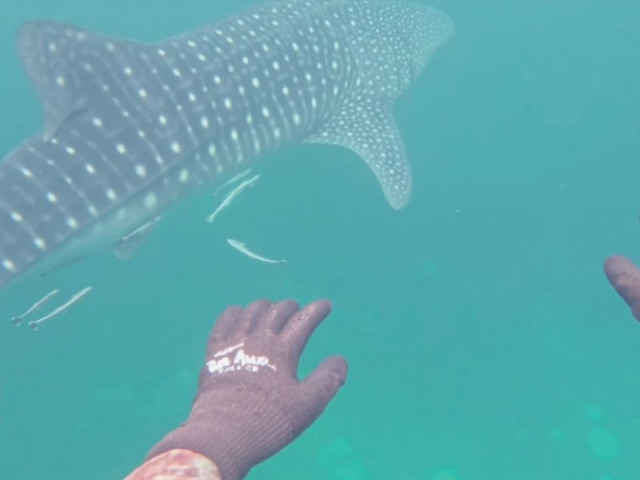Divers capture whale shark on waterproof camera
Expedition off Churna Island films exotic marine life

An amature swimmer from Karachi captured the breathtaking sight of a whale shark, which is facing extinction, on his waterproof camera during an adventurous expedition in the deep waters of Charna Island, located at the confluence of Sindh and Balochistan.
While filming, the diver touched the massive whale shark, known as one of the largest aquatic creatures in the world. According to Technical Advisor World Wildlife Fund (WWF) Moazzam Khan, the whale shark is called 'Andhi Mangra' in Sindhi and 'Baran' in Balochi. In the 1970s, hunting this species was common and a specific type of weapon called a harpoon was used for it. This harpoon consisted of both a sharp, iron spear-like tool and a rope, was thrown from a distance to hit the target, resulting in the whale shark being caught. Fishermen used to apply whale shark liver oil to the bottoms of their boats. Local fishermen also refer to the whale shark as the 'Tiger Shark' due to the distinctive white spots on its body. In the past, whale sharks were abundant in Pakistan's waters, but due to the presence of numerous fishing boats, the invention of new equipment, and indiscriminate hunting, among other reasons, this species has become globally endangered.
Khan said that there is a designated area near Charna Island known as the Important Shark and Rays Area (ISRA). This area stretches from the north of Churna to the shores of Ormara. female sharks give birth in this area, while whale sharks generally surface to bask in the sun.
He says that 15 years ago, WWF began training fishermen for the conservation of whale sharks. Over the past 8 years, around 140 whale sharks have been observed and freed from nets. As a result of this, the governments of Sindh and Balochistan imposed a ban on whale shark hunting in 2016. Moazzam Khan also said that whale sharks do not have teeth; however, in case of danger, they attack their opponents with their tails. For this reason, amateur swimmers should avoid getting closer to or touching them as much as possible.


















COMMENTS
Comments are moderated and generally will be posted if they are on-topic and not abusive.
For more information, please see our Comments FAQ